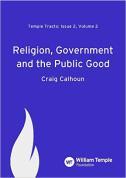Having published on the Reimagining Europe blog (with a good opening joke) a somewhat exasperated post about the political discourse around the EU Referendum in England, I went on to read the latest tract published by the William Temple Foundation and found it addressing – more eirenically than I did – some of the central issues that lie behind our limited discourse.

Written by Craig Colhoun, Director of the London School of Economics & Political Science (LSE), it is entitled Religion, Government and the Public Good. Commending the importance of imagination (imagining the world we wish to create), he identifies three problems for our contemporary political discourse, and they are pertinent to our current debates:
We live in an era that is shaped by three difficulties in being articulate. These are difficulties in saying things that we want to say but can’t quite get out, things that we know at some level but have trouble making explicit. Articulacy depends on language, on narratives, on the way we represent the world to ourselves. But we have trouble putting things properly in the focus of attention. We find it hard, I’d suggest first, to articulate a sense of purpose greater than instrumental self-interest. Second, to articulate a shared identity that is strong enough really to bind us to each other and at the same time capacious enough to recognize differences among us. And third, to articulate our relationship to history and the future, and thus to time beyond the most short-term, immediate and even ephemeral engagements.
Not a bad place to start. Or, to put it more pointedly, who is articulating a bigger vision for what the UK might become in the world of which we are inextricably a part – a vision that goes beyond mere self-interest or short-term utilitarian individualism?
Suggesting that the loss of a religious vocabulary has been harmful to our secular discourse – not primarily because it was religious, but because the imagination that fired it has not found articulation in any other vocabulary – he reflects on William Temple's social vision and invites us to constitute a new imagining of (and, therefore, commitment to) the world:
Religious traditions can be powerful shapers of such understanding. They influence how we understand not just God or angels or the power of prayer. They also influence how we understand moral obligation and social relationships. Religious imaginaries can make marriage more than merely a contract between two individuals because it is a sacrament and embedded in a community. They can impose a sharp differentiation between the sacred and the worldly. They can encourage a relationship of either stewardship or dominion in regard to the earth. This suggests why it is misleading to try to reduce religion to a set of propositions about the world that are either true or false. That misses the extent to which religious understandings, embedded in practice as well as thought, are constitutive of the world.
I doubt if Donald Trump will find his own social or economic assumptions reflected here. But, the questions Calhoun asks dig beneath some of the glib, shortsighted and purely instrumental (utilitarian) language that currently fires the passions of those arguing about our future in the European Union.
 Posted with Blogsy
Posted with Blogsy
